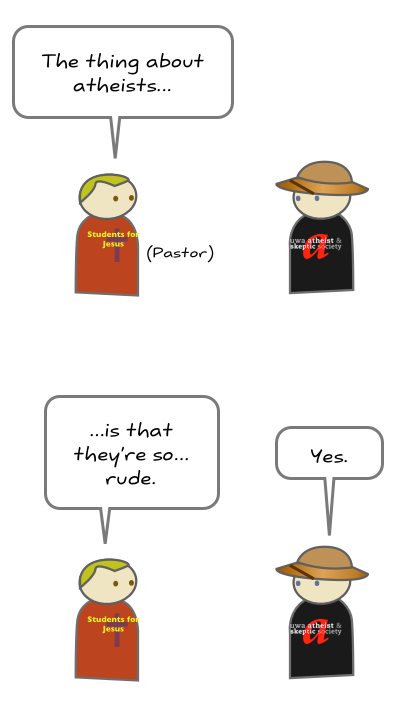I’m afraid my history of unbelief is uneventful and boring compared to others. There was no blinding moment of insight; no dramatic discarding of the chains of superstition; no wild and passionate confrontations with theistic family or friends. I was born and raised in picturesque British Columbia, Canada, which bears the proud statistic of being the most godless state or province in North America. My father comes from a fairly devout Roman Catholic family; my mother from a United Church of Canada family. Neither were believers in any real sense. Our family never attended church besides occasional accompanying my Roman Catholic grandparents when we visited them in Ontario (by the way, my Catholic grandparents were saints, who never forced their beliefs on us as children, and were always supportive of our life decisions). Curiously, my family retained the habit of saying grace before dinner; a mere rote of “Bless us, O Lord, for these thy gifts, for which we are about to receive, amen”. There was never any faith behind it; it was like saying “Bless you” after a sneeze.
(As an interesting aside, one of my distant relatives (great-great-grandmother, I believe) was one of the people reportedly “healed” by the recently canonized Saint Andre of Quebec. If true, this marks the first and last time that God bestowed any gifts on me or my family.)
As a child, I loved learning about science and nature, particularly Astronomy. I read, re-read, and re-re-ad infinitum-read books on Astronomy. I was utterly enamoured by the cosmos; the silent grandiosity of galaxies, the terrifying power of supernovae, and the majestic constellations that grace our night sky. One book I had compared and contrasted the Big Bang theory of the universe’s origin with the biblical Genesis. Though I was still young, and I did not fully grasp the scientific method yet, I remember thinking “How do they know the Bible is true? How can they back up the Genesis story with facts?”. Thus, I recognized early that the Bible, and religious ideology in general, was an empty promise; a mere story told to the gullible and the fearful.
Unfortunately, my skill (or lack thereof) with mathematics made a career in astronomy exceedingly unlikely. As a youngster, I also displayed aptitude for music, thanks to early piano lessons and the like. In high school, I was a part of virtually every musical group that my school offered. It was in high school music that I started having confrontations with religious classmates. Many had come from church choirs and the like, and wanted/demanded that we as a group pray before a performance. This irked me, and I would often reply with a snarky “shouldn’t we be praying to Dionsyus, the Greek God of wine, music and partying, instead of God?”. Or when someone tried to sell me the idea that Christianity is a religion of love, I would reply if it’s the same religion of love that murdered millions during the Crusades and Dark Ages. At the risk of sounding like a hipster, I was a new atheist before I had any idea that such a thing existed.
After high school, I was left adrift. My confidence in my music skills was at an all-time low; I didn’t think I could make a career out of music. At my mother’s behest, I enrolled in night school, to add some courses that I had elected to skip earlier. It was here that I fell in love with Biology, and the sciences in general. I aced just about everything thrown at me (although I continued to struggle with Math). To cut a long story short, I went on to attain a diploma in Biotechnology, a BSc in the same, and an MSc in Microbiology. Today I work as a researcher in a local biotech/pharmaceutical company. I still enjoy music and play piano and guitar recreationally. Only recently (last 2 years or so) have I come to identify myself as a new atheist, and have started to read the works of the movement. I don’t do much in the community…as mentioned above, B.C. is a godless haven, and the religious have little influence on our society. But I fully support my brothers and sisters who, by accident of birth, are forced to live in areas where religious influence is strong.
Matt Waldbrook
Canada


